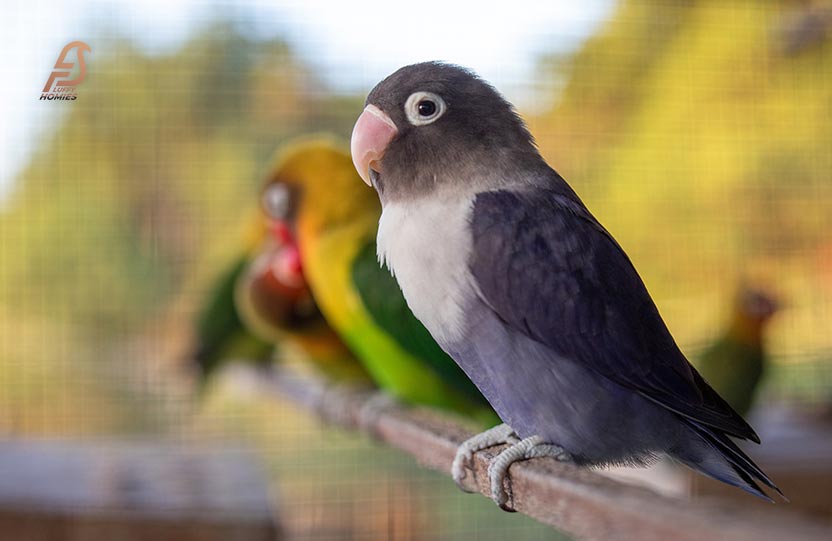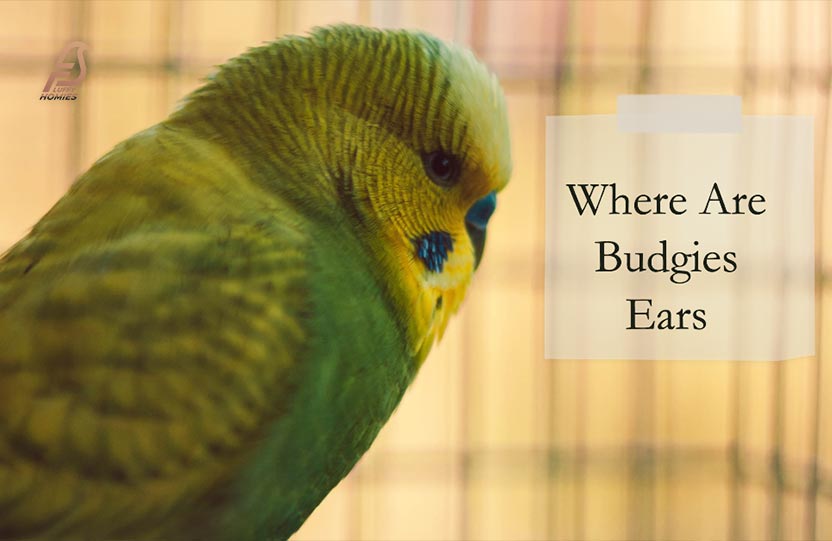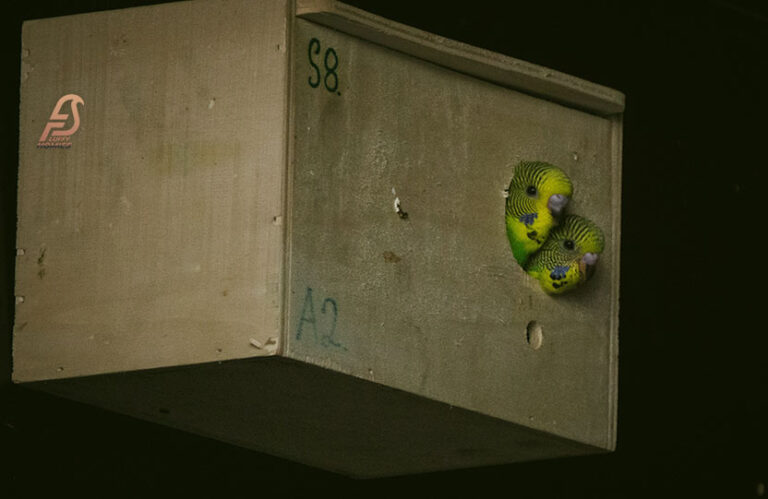Where Are Budgies Ears? (Do Budgies Have Ears 2024)
Small and colorful parakeets, budgerigars (or budgies) are beloved pets all around the globe.
Everyone seems to be staring at their colorful feathers and lively personality, but have you ever considered where are the budgies ears?
Learn all about the anatomy of the budgie ear, where it’s concealed, and what it does in this article as we dive into the intriguing world of budgies. Join me in solving the riddle of budgies’ perky little ears!
Do Budgies (Parakeets) Have Ears?
There are many mysterious things about budgies that people don’t know like are budgies destructive and more.
With their acute hearing, budgies can hear their surroundings, call out to other birds in the flock, and identify danger.
Although they do not have external auditory canals like humans and most other animals, their internal auditory canals are exceptionally well-adapted to detect sound.
Notice how important budgies’ highly developed sense of hearing is to their very existence.
Because of their exceptionally good hearing, they are able to hear the cries of other birds in the flock, express themselves vocally, and identify any threats in their environment.
How Do Budgies Hear?
Sound waves are the starting point for the budgie hearing process which makes them smarter as compare to cats. The tympanum, a specialized structure that doubles as an eardrum, is responsible for capturing sound waves that reach a budgie’s ears.
A tiny membrane called the tympanum vibrates in reaction to sound waves; it is situated behind their eyes.
When acoustic waves enter the eardrum, they trigger membrane vibrations. Next, these vibrations are sent to the complex structures within the inner ear, where the processing of sound occurs.
Budgies like purple parakeets have an inner ear structure called the cochlea, which is a spiral-shaped organ that contains fluid and sensitive hair cells.
These hair cells are responsible for transforming vibrations into brain-readable electrical messages.
After the hair cells generate an electrical signal, the auditory nerve carries it to the brain.
The budgie is able to understand and react to its surroundings by processing these impulses in its brain.
Buggies have an extraordinary hearing mechanism that allows them to pick up sounds throughout a vast spectrum, even ones that humans can’t perceive.
Where Are Budgies Ears Located?
We need to investigate the peculiar anatomy of budgies in order to find out where their ears are. Budgies lack external auditory organs and lobes, distinguishing them from humans and a great number of other animals.
They have ears that are deep inside their skulls instead. One of the unique anatomical features of budgies is the “tympanum,” sometimes called the eardrum.
Just behind their eyes is a small membrane called the tympanum. Budgies have internal ears that are not visible to the naked eye. They benefit from this concealed location in more ways than one.
The budgie’s ability to keep its ears inside its skull allows it to withstand the stresses of its natural environment, whether it’s flying or interacting with its surroundings and that beauty makes them valuable.
What really distinguishes budgies from a lot of other animals is their lack of external ears. Even though they can’t see them, their hearing is exceptional and crucial to their survival.
What follows is an examination of the auditory system of budgies, how noise affects their hearing, and proper ear care for these vulnerable birds.
Also Read: Why Are My Budgies Feet Hot?
Why Do Budgies Have Hidden Ears?
An intriguing element of the morphology of budgies is the internal positioning of their ears.
In contrast to numerous animal species, including humans, budgies possess their ears concealed within their cranium. This concealed positioning fulfills a multitude of critical functions.
A primary reason budgies have concealed ears is as a protective evolutionary adaptation. Budgies are active and dexterous avian species that frequently explore their surroundings by flying.
Due to the fact that their ears are positioned deep within their cranium, budgies are less susceptible to harm or injury during aerial acrobatics or object interactions.
In addition, budgies possess an improved capacity to precisely localize sound sources due to the internal positioning of their hearing.
The ability to accurately localize sounds enables them to ascertain their source in terms of direction, a critical capability when it comes to identifying potential dangers or locating fellow members of their flock.
Additionally, the concealed antennae of budgies aid in their streamlined appearance.
The absence of external ears or earlobes enhances the overall aesthetic allure of these creatures by providing uninterrupted, sleek head plumage.
How Does Noise Affect Your Budgies?
Budgies have highly sensitive hearing, and exposure to loud or continuous noise can have a significant impact on their well-being. After that people wonder can budgies sleep with the TV on or not.
Budgies, being gregarious organisms, depend on their vocalizations as a means of communication and interaction with other members of their flock. They may become anxious and uneasy if their communication is disrupted by an excessive amount of commotion.
Extended exposure to high-pitched auditory stimuli, including construction noise, harsh domestic appliances, or blaring music, has the potential to induce permanent auditory impairment in budgies.
Extended periods of exposure to elevated decibel levels may lead to the development of hearing loss or other auditory complications. Besides the physiological repercussions, commotion has the potential to induce anxiety and tension in budgies.
Extended exposure to disruptive or harsh noises may cause them to become agitated, display distressing symptoms, or even develop behavioral issues.
Establishing a tranquil and silent habitat for your budgies is critical in safeguarding their general welfare.
How Good Are Budgie’s Hearing Skills?
Budgies, sometimes known as budgerigars, are incredibly perceptive birds that likes to climb. An important part of these little parakeets’ ability to communicate and stay alive is their remarkable hearing.
Budgies have a remarkable ability to hear noises throughout a broad spectrum, even some that humans cannot.
Through complex vocalizations, they are able to interact with one another due to their heightened sensitivity to tonal differences.
Budgies can hear the cries of their fellow birds, see danger, and even differentiate between human speech thanks to their acute hearing.
Finding food sources including earthworms and remaining alert in their habitat are both aided by this enhanced aural awareness.
Budgies are incredibly adaptable, gregarious, and able to navigate their environments thanks in large part to their remarkable hearing abilities.
Can Budgies Hear Human Voices?
Budgies do indeed perceive human voices. Their exceptional auditory perception enables them to discern an extensive spectrum of auditory stimuli, encompassing the subtleties of human speech.
Budgies have the ability to differentiate between various rhythms, melodies, and tones, which allows them to identify and react to the voices of their owners.
When you speak to your budgie, they may tilt their heads, chirp, or even mimic certain words or phrases. Some times due to loud voices they are starting to scared of humans.
Building a bond with your budgie through vocal interaction is a wonderful way to foster a strong relationship and create a positive and engaging environment for them.
How You Can Help Your Parakeet’s Hearing?
Caring for your budgie’s ears is an essential part of ensuring their overall well-being. Sometimes they are panting due some problems but owners what is it.
Here are some tips to help you promote optimal hearing for your feathered friend:
Create a Peaceful Environment
Minimize exposure to loud noises and sudden bursts of sound that can stress your budgie’s delicate hearing system and cover their cage at night.
Avoid placing their cage near loud appliances, speakers, or areas with excessive noise. Provide a calm and quiet space where they can feel secure and relaxed.
Monitor Noise Levels
Be mindful of the noise levels in your home environment. Avoid playing loud music or engaging in noisy activities near your budgie.
If you must use household appliances or engage in activities that generate noise, consider moving your budgie’s cage to a quieter area or providing them with a temporary quiet space.
Regular Veterinary Check-ups
Schedule regular check-ups with an avian veterinarian who can assess the health of your budgie’s ears and overall auditory system.
Regular examinations can help detect any potential issues early on and allow for prompt treatment if necessary.
Provide Mental Stimulation
Engage your budgie in activities that stimulate their auditory senses. Offer a variety of toys with different textures, shapes, and sounds.
This will not only provide mental enrichment but also keep their auditory system active and engaged.
Socialize and Interact
Budgies are highly social birds, and regular interaction with their human caregivers and fellow budgies is important for their well-being.
Interact with your budgie through gentle conversation and vocal interactions. This socialization helps keep their auditory senses sharp and strengthens the bond between you and your budgie.
Also Check: Why Do Budgies Talk in Their Sleep?

Can You Check the Health of a Budgie’s Ears?
Assessing the health of a budgie’s ears is an important part of their overall well-being. While their ears are hidden, there are ways to observe and monitor their aural health. Here are some methods to check the health of a budgie’s ears:
Visual Inspection
You can perform a visual inspection of your budgie’s ears by gently lifting their feathers around the ear area. Look for any signs of redness, swelling, discharge, or excessive wax buildup.
These can be indications of an ear infection or other ear-related issues. If you notice any abnormalities, it is advisable to seek guidance from an avian veterinarian.
Behavior Observation
Monitor your budgie’s behavior for any signs of discomfort or distress related to their ears.
If they repeatedly scratch or rub their ears against perches or toys, shake their head vigorously, or show signs of pain when touched around the ear area, it could be an indication of ear problems.
In such cases, it is recommended to consult with a veterinarian who specializes in avian care.
Veterinary Examination
Regular check-ups with an avian veterinarian are essential for ensuring the overall health of your budgie, including its ears.
During a veterinary examination, the veterinarian can carefully examine the budgie’s ears using specialized equipment and techniques.
They can identify any signs of infection, blockage, or other issues that may require treatment.
Professional Advice
If you have any concerns or questions about your budgie’s ear health, it is always best to consult with a qualified avian veterinarian.
They have the expertise and experience to assess and address any potential ear-related problems.
They may recommend further tests or procedures if necessary, such as ear swabs or cultures, to diagnose and treat specific conditions.
Remember, attempting to diagnose or treat ear problems without proper knowledge and training can be risky and potentially harmful to your budgie.
It is important to rely on professional advice and guidance from an avian veterinarian for the best care of your budgie’s ears.
What are the Common Misconceptions About Budgies’ Ears?
Misconceptions surrounding budgies’ ears are not uncommon. Let’s address some of the common misconceptions and shed light on the truth:
Budgies have external ears.
Contrary to popular belief, budgies do not have external ears or visible earlobes. Their ears are located internally, deep within their skulls.
The absence of external ears contributes to their streamlined appearance and protects their delicate ear structures.
Budgies cannot hear well.
On the contrary, budgies have exceptional hearing abilities. Their internal auditory system, including the tympanum, cochlea, and auditory nerve, allows them to perceive a wide range of frequencies and detect subtle sounds.
Their keen sense of hearing is vital for communication, navigation, and survival.
Budgies can only hear high-pitched sounds.
While budgies are capable of hearing high-pitched sounds, their hearing range extends beyond that.
They can detect a broad range of frequencies, including some that are beyond the range of human hearing. This wide range allows them to perceive various environmental sounds and engage in vocal communication.
Budgies’ ears are not important for their well-being.
On the contrary, the health and well-being of budgies’ ears are essential. Protecting their hearing abilities and providing a calm auditory environment is crucial for their overall happiness and quality of life.
Taking care of their ears involves minimizing exposure to loud noises, regular veterinary check-ups, and creating a stress-free environment.
Conclusion — Where Are Budgies Ears?
Budgies’ ears are hidden treasures nestled within the sides of their heads. These inconspicuous auditory meatus grant budgies exceptional hearing abilities and contribute to their remarkable balance and orientation.
Despite lacking external ear openings, these charismatic birds rely on their internal ear structures to navigate their world with finesse.
Remember to care for your budgie’s ears by monitoring their cleanliness and seeking professional help if any concerns arise.
Appreciate the marvels of budgies’ ears, knowing they play a vital role in their sensory experience and overall well-being.
FAQs — Where Are Budgies Ears?
How often should I clean my budgie’s ears?
Budgies’ ears generally require minimal cleaning as they naturally maintain cleanliness themselves. However, if you notice any abnormalities or signs of infection, consult a veterinarian.
Do budgies have good hearing?
Yes, budgies can hear quite well. They are able to adapt to their surroundings, identify potential dangers, communicate with one another through complex vocalizations, and navigate their habitat with ease all because of their exceptional hearing.
Are budgies sensitive to noise?
Indeed, budgies are quite sound-sensitive. Loud noises might stress them out because of their acute hearing, which makes them susceptible to a variety of sounds. To make sure these birds are healthy, it’s best to give them a peaceful place to live.
Can I use cotton swabs to clean my budgie’s ears?
It is not recommended to use cotton swabs or any similar objects to clean your budgie’s ears. If you have concerns about your budgie’s ear health, consult a qualified avian veterinarian for proper guidance and care.
Do pet budgies talk?
Certainly, budgies kept as pets may acquire verbal communication skills. One of their abilities is to imitate noises, including human speech. Some budgies, given enough time and effort spent training, may learn basic words and phrases and even carry on rudimentary conversations with their owners.






